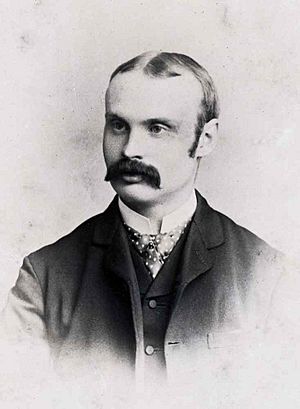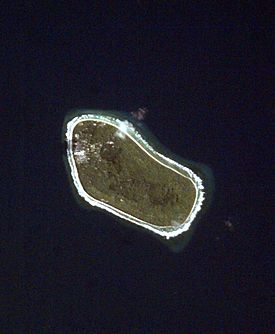Fred Whibley facts for kids
Quick facts for kids
Fredrick George Whibley
|
|
|---|---|

Fred Whibley, an island trader in Tuvalu around 1888
|
|
| Born | 1855 Sittingbourne, Kent, England
|
| Died | 1919 |
| Other names | Fred Whibley |
| Occupation | island trader |
| Parent(s) | Ambrose Whibley and Anne Parkes |
Fred Whibley (born Fredrick George Whibley, 1855–1919) chose a very different life than most people in his time. He left his job as a bank clerk in London to escape the strict rules and expectations of the Victorian era. He ended up becoming a copra trader on the island of Niutao in Tuvalu, a country made of many islands in the central Pacific Ocean.
Fred was born in 1855 in Sittingbourne, England. His father, Ambrose Whibley, was a silk merchant. Fred went to Bristol Grammar School. After his mother, Anne, passed away, his father married Mary Jean Davy. Fred had several half-siblings, including Charles Whibley, who became a journalist, and Leonard Whibley, a famous scholar. His sister, Eliza Eleanor, married John T. Arundel, who owned a big company that worked in the Pacific.
Fred's Early Adventures
Fred Whibley worked as a bank clerk from 1873 to 1888. When he was 33, he decided to leave England and travel to the United States. From letters he wrote to his brother Charles, it seems he was involved in gold mining for a while. Even though the famous Klondike Gold Rush started later, it seems Fred didn't find much gold.
By 1898, Fred needed money to travel from Vancouver, Canada, to Sydney, Australia. His sister Eliza was living there with her husband, John T. Arundel. Fred was known in his family as someone who didn't always follow the rules. He was seen as a bit rebellious compared to his very proper Victorian family.
Life as an Island Trader in Tuvalu
While in Sydney, Fred Whibley was offered a job by his brother-in-law, John T. Arundel. Arundel's company mined guano, which is used as fertilizer, on Pacific islands. This company later became the Pacific Phosphate Co., which mined valuable phosphate on Nauru and Banaba. However, Fred turned down the offer. He seemed to prefer living on a quiet Pacific island, away from the busy and strict life he had known in Europe.
Around May or June 1898, Fred arrived on Niutao in Tuvalu, which was then called the Ellice Islands. He started working as an island trader for a company called Henderson and Macfarlane. This company was very important in the copra trade in Tuvalu. Copra is dried coconut meat, which is used to make coconut oil. Fred's job was to buy copra from the islanders. Henderson & Macfarlane used a ship called the SS Archer to visit islands in Fiji, Tuvalu, and Kiribati.
The people of Niutao called Fred "Felele." He married a woman named Meri Matavaka from Niutao. Fred and Meri had three daughters: Lucy (born in 1899), Felicita (known as Fay, born in 1905), and Lillian (born in 1911). Sadly, Meri passed away after Lillian's birth.
After Meri's death in 1911, Fred moved to Funafuti, another island in Tuvalu. He passed away in 1919. His daughters were cared for by their large extended family on Niutao. Later, missionaries took the girls away from their family and island, except for Lillian, who was hidden by her cousins for some years. The girls are still remembered in Tuvalu as "the stolen ones."
Changes in Trading
During Fred Whibley's time as an island trader, the way trading companies worked in the Pacific began to change. Companies started to move away from having traders live on each island. Instead, a supercargo (a person in charge of the cargo on a trading ship) would deal directly with the islanders when a ship visited. Because of this change, the number of European traders living on the islands in Tuvalu went down. By 1909, there were no longer any European traders living there for the trading companies.
Fred Whibley died on Funafuti in 1919.
 | Lonnie Johnson |
 | Granville Woods |
 | Lewis Howard Latimer |
 | James West |


